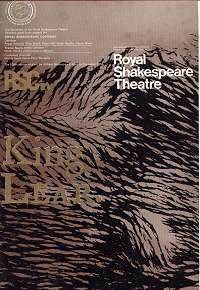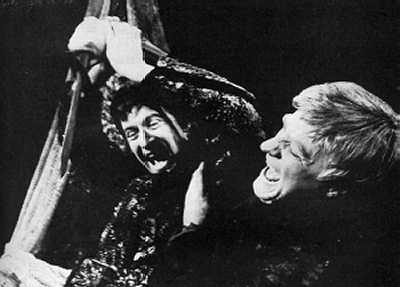
 |
|
Skakespeare's King Lear is a brooding, malevolent play that questions the basic structure of society and the authority that cements it together. If a king cannot rule without a crown, if a father cannot trust his children, if a family generates no loyalty, if civilisation can breed nothing but greed, violence and self-interest - then anarchy and ultimately insanity are the only routes left for man to take. Trevor Nunn's impressive production at the Royal Shakespeare Theatre, Stratford-on-Avon relentlessly drives home the philosophical message of this massive, almost intractable, masterpiece. Played against a wall of inky blackness with a barren stage devoid of everything but the most essential props, his actors take on the quality of gesticulating puppets, enveloped in a universe too big and too demanding for any man's comprehension. |
 |
It is a dour, hunched, vigorous octgenarian that holds sway over a gorgeous court of black and gold costumed subjects when we first see King Lear denounce Cordelia for not professing enough love for him. In a thunderous pique he hands over his domain to his vicious daughters, Goneril and Regan.
When this act of paternal faith results in Lear's being banished to a blasted heath where his cracked brain can only communicate with a fool and a madman, Nunn pushes us into a metaphysical world of pagan darkness and spiritual confusion. We shudder and wonder at man's ability to fall so far.
Eric Porter's magnificent Lear, raging at fate with demonic fear and futility, has about it at times the agonising, authentic cry of eternal pain one associates with a painting by Goya or Francis Bacon.
Other exciting performances abound. Alan Howard makes the impossible part of Edgar seem relevant both in its sanity and its madness. As he achieves this while being probably the most naked man ever seen on a British stage, it is a considerable feat.
Michael Williams, as the Fool, provides an eerie counterpoint to Lear's tottering grandeur. Norman Rodway's Edmund is successfully sinister and cynical.
Only Lear's daughters failed to blend in with this aura of timeless despair. Sheila Allen and Susan Fleetwood, brandishing hair-styles about as medieval as Vogue, seemed more petulant than evil.
And Diane Fletcher's Cordelia, inexplicably fitted out like Joan of Arc, never roused our tears. But these are minor quibbles in a splendid and imaginative production.
Milton Shulman
London Evening Standard, 11.4.68.